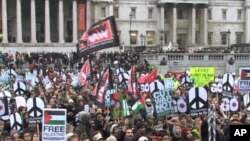Britain has just passed a grim milestone: A hundred British servicemen have been killed in Afghanistan this year alone. As NATO leaders agreed in Portugal over the weekend to hand over security to Afghan forces by 2014, protesters in Britain were calling for an immediate withdrawal of troops. There have been many protests against the Afghan war in Britain, but this one was different.
Saturday's march was led by Afghan war veteran and former soldier, Joe Glenton. On Saturday, he also handed back his medal after spending 9 months in jail for refusing to return to Afghanistan for a second tour.
"This is again an example of the continued resistance and disgust of people at this war, that's being dragged out as a face-saving measure," said Glenton.
Britain has more than 9,000 troops in Afghanistan, second only to the U.S. More than 300 have been killed since the war began. The human toll is leading to growing calls for the troops to come home.
Remembrance Services are held every November to honor servicemen and women who've died in combat. This year they were dedicated to those who were killed in Afghanistan.
Prince Harry, who served in Afghanistan, attended the opening of this Garden of Remembrance, west of london.
Alongside the 346 others, he planted a cross in the ground for his friend, Lance Corporal of Horse Jonathan Woodgate, who died earlier this year.
Jonathan's father recalled conversations he had with his son while he was serving in Afghanistan.
"I'd try to get out of him what he'd been up to and he'd say, 'Just stuff Dad, just stuff.' But now that his workmates as he would refer to them have told me what he got up to, he was a hero, absolute," said Tony Woodgate.
Support among the public for the British armed forces is high. Fields of Remembrance like this are another example of the respect shown to British soldiers serving overseas. But support for the actual conflict they're fighting in Afghanistan is less certain.
Polls show over 70 percent of the public believes the war is not winnable. And with Britain facing unprecedented cuts in government spending, many are beginning to question the $8-billion annual cost of the Afghan war.
Conscious of the skeptics back home, British Prime Minister David Cameron, at the NATO summit in Portugal, offered 2015 as a concrete date for Britain's withdrawal.
"It is, if you like, a backstop," said Cameron. "But let me be clear, it is a deadline and I think the British public deserve a deadline. By 2015, we would have been in Helmand province, the toughest part of Afghanistan, for nine years."
If British forces do stay that long, there could be many more crosses at the Garden of Remembrance.
Doubts remain over whether the public has the stomach to go for another five years.




